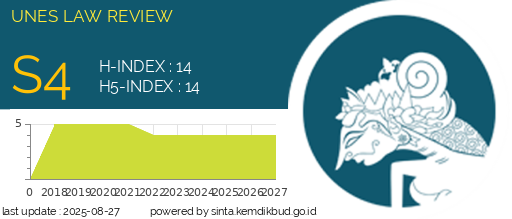Pelanggaran Kode Etik Kepolisian Negara Indonesia Terkait Penyelewengan Wewenang Pejabat Kepolisian
DOI:
https://doi.org/10.31933/unesrev.v6i4.1936Keywords:
Kepolisian, Penegakan Hukum, Wewenang, TugasAbstract
The state has the right to govern its territory and citizens, but this cannot be done without the assistance of state institutions. One such institution that helps in the administration of governance is the Indonesian National Police, whose duties are regulated by Undang-Undang Nomor 2 Tahun 2002. In carrying out their duties, the Indonesian National Police have a code of ethics as a guide for their members to reflect the comprehensive character of a police officer. However, as time progresses, changes occur in the ethics and morality of police members, which led to the establishment of Peraturan Kepolisian Negara Republik Indonesia Nomor 7 Tahun 2022 Tentang Kode Etik Profesi dan Komisi Kode Etik Kepolisian Negara Republik Indonesia. Violations of this code, particularly by high-ranking officials, such as the case of Teddy Minahasa, a former high-ranking police officer, hinder the enforcement of law. Therefore, it is crucial for the Indonesian National Police to follow and practice ethics in their duties, such as state ethics, institutional ethics, community ethics, and personal ethics. By adhering to these ethics, it is hoped that police members can carry out their duties with commitment, honesty, and high responsibility, for the safety, welfare, and unity of the nation. However, to address these violations, it is necessary to enforce the law firmly and to continuously prevent and cultivate police members to understand and internalize these ethics in every aspect of their life and duties.
Downloads
References
Indonesia. (2002). Peraturan Kepolisian Negara Republik Indonesia Nomor 7 Tahun 2022 Tentang Kode Etik Profesi dan Komisi Kode Etik Kepolisian Negara Republik Indonesia.
Lampung, P. (2023, November 8). Humas Polri. Diambil kembali dari humas.polri.go.id: https://humas.polri.go.id/2023/11/08/kepercayaan-polri-capai-764-berdasarkan-survei-indikator-politika/
Alfian, E. (2020). Tugas dan Fungsi Kepolisian Untuk Meningkatkan Kepercayaan Publik Terhadap Penegak Hukum. Legalitas: Jurnal Hukum, 27-37.
Amiruddin & Zainal Askin. Pengantar Metode Penelitian Hukum.
Wahyuni, W. (2023, May 8). Hukum Online. Diambil kembali dari hukumonline.com: https://www.hukumonline.com/berita/a/tiga-jenis-metodologi-untuk-penelitian-skripsi-jurusan-hukum-lt6458efc23524f/
Tamrin, M. T. (2018). Lembaga Kepolisian Dalam Sistem Penyelenggaraan Pemerintah Negara Indonesia. Maleo Law Journal, 133-142.
Presisi, A. (2023, Maret 3). Aksi Presisi. Diambil kembali dari aksipresisi.polri.go.id: https://aksipresisi.polri.go.id/articles/jika-melanggar-aturan-kapolri-anggota-boleh-tolak-perintah-atasan
Indonesia. (2009). Undang-Undang Nomor 35 Tahun 2009 Tentang Narkotika.
Ansori, L. (2022, Oktober 15). Mengerti. Diambil kembali dari mengerti.id: https://www.mengerti.id/sosok/pr-6645199723/biodata-teddy-minahasa-profil-agama-istri-pendidikan-hingga-karir-di-kepolisian
Downloads
Published
How to Cite
Issue
Section
License
Hak cipta :
Penulis yang mempublikasikan manuskripnya di jurnal ini menyetujui ketentuan berikut:
- Hak cipta pada setiap artikel adalah milik penulis.
- Penulis mengakui bahwa UNES Law Review berhak menjadi yang pertama menerbitkan dengan lisensi Creative Commons Attribution 4.0 International (Attribution 4.0 International CC BY 4.0) .
- Penulis dapat mengirimkan artikel secara terpisah, mengatur distribusi non-eksklusif manuskrip yang telah diterbitkan dalam jurnal ini ke versi lain (misalnya, dikirim ke repositori institusi penulis, publikasi ke dalam buku, dll.), dengan mengakui bahwa manuskrip telah diterbitkan pertama kali di Jurnal UNES Law Review.



















